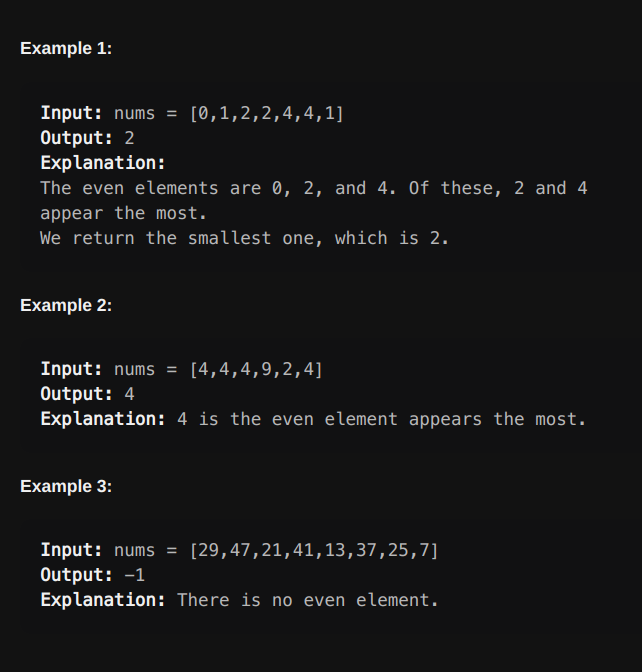How to create Rspec tests for your LeetCode solutions in Ruby?
 Alexandre Calaça
Alexandre CalaçaTable of contents

Topic
How to create Rspec tests for your LeetCode solution problem in Ruby?
Requirements
Make sure your LeetCode solution is correct before writing the RSpec tests. The tests will verify that your solution behaves as expected for the provided test cases. If the tests fail, you can debug and fix your LeetCode solution accordingly.
Create the rspec file
In the terminal, run the following:
touch most_frequent_even_element_spec.rb
The touch command in Linux is used to create an empty file or update the timestamp of an existing file without changing its content.
The primary purpose of the touch command is to modify the access and modification times of a file.
If the file doesn't exist, touch creates a new empty file with the specified name.
Require the solution problem file
# spec/most_frequent_even_element_spec.rb
require_relative "../lib/most_frequent_even_element"
In Ruby, require_relative is a method used to load a file located relative to the current file.
It allows you to include code from another Ruby file in your current file so that you can access classes, modules, methods, and constants defined in that external file.
By using require_relative in RSpec test files, you can easily include the implementation files that you want to test. This way, RSpec can access the classes and methods defined in the implementation files and test their functionality.
Require rspec
require 'rspec'
So far, this is what we have
# spec/most_frequent_even_element_spec.rb
require_relative "../lib/most_frequent_even_element"
require 'rspec'
Test it
In the terminal, inside the project directory, run the following command:
rspec spec/most_frequent_even_element_spec.rb
Since you do not have any specific rspec tests so far, you should be able to see something like the following:
No examples found.
Finished in 0.00085 seconds (files took 0.04266 seconds to load)
0 examples, 0 failures
Write a describe block
Write a describe block to define the behavior you want to test.
# spec/most_frequent_even_element_spec.rb
RSpec.describe 'most_frequent_even_element' do
end
The complete code so far
# spec/most_frequent_even_element_spec.rb
require_relative "../lib/most_frequent_even_element"
require 'rspec'
RSpec.describe 'most_frequent_even_element' do
end
In RSpec, describe is a fundamental block used for organizing and defining test examples. It is used to group related examples together and to describe the behavior of the code being tested.
The primary purpose of describe is to provide a clear and descriptive context for the tests, making them more readable and maintainable.
This is a basic syntax of describe:
describe "Topic I want to test" do
# Test examples go here
end
The argument passed to describe is typically a string that describes the subject or feature being tested. It can be a class, a module, a method, or any other logical grouping of functionality.
Pay attention to the first word RSpec, because it is case-sensitive. So, as an example, if you type rspec instead of RSpec. you'll get the following error message:
Failure/Error:
Rspec.describe 'most_frequent_even_element' do
end
NameError:
uninitialized constant Rspec
Did you mean? RSpec
Test it
In the terminal, inside the project directory, run the following command:
rspec spec/most_frequent_even_element_spec.rb
Since you do not have any specific rspec tests so far, you should be able to see something like the following:
No examples found.
Finished in 0.00029 seconds (files took 0.06973 seconds to load)
0 examples, 0 failures
Create a subject
# spec/most_frequent_even_element_spec.rb
subject { most_frequent_even(nums) }
The complete code would look like this
# spec/most_frequent_even_element_spec.rb
require_relative "../lib/most_frequent_even_element"
require 'rspec'
RSpec.describe 'most_frequent_even_element' do
subject { most_frequent_even(nums) }
end
In RSpec, subject is a helper method that is commonly used to define the object or instance that is the subject of the test.
It simplifies the test code and makes it more readable by allowing you to refer to the subject without repeating its instantiation or method calls in each example (spec).
The subject method can be used in two ways: implicit and explicit.
Test it
In the terminal, inside the project directory, run the following command:
rspec spec/most_frequent_even_element_spec.rb
Since you do not have any specific rspec tests so far, you should be able to see something like the following:
No examples found.
Finished in 0.00025 seconds (files took 0.05076 seconds to load)
0 examples, 0 failures
Create contexts
This can help you organize your tests and provide more meaningful descriptions for different scenarios.
For example, you can group tests based on different examples, input cases, edge cases, or specific conditions you want to test.
Some words are usually associated with contexts, such as when, with, without and given.
Since I'm creating rspec tests for the [LeetCode Most Frequent Even Element](https://leetcode.com/problems/most-frequent-even-element/)**\, I decided to use the examples in contexts.

Take a look at the complete code so far:
# spec/most_frequent_even_element_spec.rb
require_relative "../lib/most_frequent_even_element"
require 'rspec'
RSpec.describe 'most_frequent_even_element' do
subject { most_frequent_even(nums) }
context 'when the input array is empty' do
end
context 'when the input array has no even elements' do
end
context 'when the input array contains even elements' do
context 'when there is only one even element' do
end
context 'when there are over two even elements' do
end
context 'when there is a tie' do
end
end
end
Test it
In the terminal, inside the project directory, run the following command:
rspec spec/most_frequent_even_element_spec.rb
most_frequent_even_element_spec.rb is the filename. Since you do not have any specific rspec tests so far, you should be able to see something like the following:
No examples found.
Finished in 0.00016 seconds (files took 0.05174 seconds to load)
0 examples, 0 failures
Create the first failing test
# spec/most_frequent_even_element_spec.rb
context 'when the input array is empty' do
let(:nums) {[]}
it 'returns the number -1' do
is_expected.to eq(-9)
end
end
Just to make sure the test is really working, I want to make it fail. In the terminal, press the following command:
rspec spec/most_frequent_even_element_spec.rb:7
Now, it's expected to see an error message:

Failures:
1) most_frequent_even_element when the input array is empty returns the number -1
Failure/Error: is_expected.to eq(-9)
expected: -9
got: -1
(compared using ==)
# ./spec/most_frequent_even_element_spec.rb:11:in `block (3 levels) in <top (required)>'
Finished in 0.01873 seconds (files took 0.05334 seconds to load)
1 example, 1 failure
Failed examples:
rspec ./spec/most_frequent_even_element_spec.rb:10 # most_frequent_even_element when the input array is empty returns the number -1
Make the first test pass
# spec/most_frequent_even_element_spec.rb
context 'when the input array is empty' do
let(:nums) {[]}
it 'returns the number -1' do
is_expected.to eq(-1)
end
end
Now, you should be able to see a new happy message:
Run options: include {:locations=>{"./spec/most_frequent_even_element_spec.rb"=>[7]}}
.
Finished in 0.00078 seconds (files took 0.05265 seconds to load)
1 example, 0 failures
Add the other tests
Just to show you as an example, this is my complete rspec file.
# spec/most_frequent_even_element_spec.rb
require_relative "../lib/most_frequent_even_element"
require 'rspec'
RSpec.describe 'most_frequent_even_element' do
subject { most_frequent_even(nums) }
context 'when the input array is empty' do
let(:nums) {[]}
it 'returns the number -1' do
is_expected.to eq(-1)
end
end
context 'when the input array has no even elements' do
let(:nums) {[1, 9, 3, 3, 7, 5, 5]}
it 'returns -1' do
expect(subject).to eq(-1)
end
end
context 'when the input array contains even elements' do
context 'when there is only one even element' do
let(:nums) {[8, 9, 3, 3, 7, 5, 5]}
it 'returns the only one even element' do
expect(subject).to eq(8)
end
end
context 'when there are over two even elements' do
let(:nums) {[4, 2, 2, 3, 7, 4, 4]}
it 'returns the most frequent' do
expect(subject).to eq(4)
end
end
context 'when there is a tie' do
let(:nums) {[4, 2, 2, 3, 2, 4, 4]}
it 'returns the smallest' do
expect(subject).to eq(2)
end
end
end
end
Github Repository
In case you want to follow along, in progress.
Celebrate

Let's become friends
Final thoughts
I hope this article helped you. Let me know if you have any questions. Your thoughts, suggestions and corrections are more than welcome.
By the way, feel free to drop your suggestions on new blog articles.
Hope to see you next time.
Subscribe to my newsletter
Read articles from Alexandre Calaça directly inside your inbox. Subscribe to the newsletter, and don't miss out.
Written by

Alexandre Calaça
Alexandre Calaça
I'm a passionate software developer.